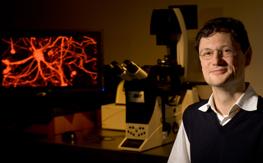
In a “dramatic” breakthrough that has positive implications for Parkinson’s or Alzheimer’s, researchers have transformed ordinary mouse skin cells directly into functioning nerve cells, bypassing the need for stem cells or even stemlike cells and greatly speeding up the field of regenerative medicine.
The research, from Stanford’s Institute for Stem Cell Biology and Regenerative Medicine , could make it possible to someday take a sample of a patient’s skin and turn the cells into a tailor-made transplant to treat brain diseases such as Parkinson’s or Alzheimer’s, or heal damaged spinal cords.
(Continue reading the story at Reuters.com)



















